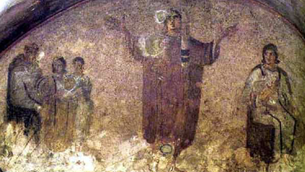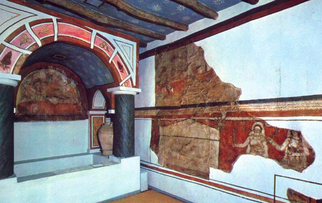 Some sermon prep thoughts . . . the fuller text is Galatians 3:23-4:7 . . . and yes, this is a Christmas Season Sermon text . . . See Galatians 4:4. The part I am reflecting on is the well known Galatians 3:27-39: “For as many of you as were baptized into Christ have put on Christ. There is neither Jew nor Greek, there is neither slave nor free, there is no male and female, for you are all one in Christ Jesus. And if you are Christ's, then you are Abraham's offspring, heirs according to promise” (Galatians 3:27-29). I am not sure that we fathom how radically deconstructing these words would have been for the Greek, Roman, and Jewish man, especially male head of households, who were also masters of household slaves . . . nor can we (but we should) grasp the radical reconstruction and liberation these same exact words would have been to the Greek, Roman, and Jewish women and slaves and free (emancipated) slaves, who had no home or legal status whatsoever . . . interestingly we forget that Paul just mentioned sonship (“you are all sons of God, through faith,” v. 26) and will soon talk again about sonship and heirs (Gal 4:1-7), that is, being sons of God. I know we like to be modern and relevant and say “sons and daughters of God,” attempting to get past the so-called ancient gender-bias; but this is both unwarranted and does injustice to the text in its culture—depriving the Christian, especially the female Christian, of its impact. “Sons” were everything in the Greek, Roman, and Jewish world. They got everything. They had far more respect. They got citizenship. And if you were the first born male, an heir to family wealth, possessions, land, and legacy. The goal of marriage to the Greek and Roman was to produce a legitimate male heir citizen for the Empire. So, to deprive the female Christian direct title “son” with all of its rights and privileges (as it would have meant to the ancient world reader) would simply be not right, unfair, unjust, unbiblical . . . it would not be Christian. The impact of such sonship on the Jew, the Greek, slave or emancipated slave is left with no contemporary translative spin—as it should be. Yet, our cultural sensitivity (although sincere and well-meaning at times) toward the gender-bias we have robed the sister in Christ of the applicable impact on her status as a “son of God.” And, for sure, this simple slight of hand turning “sons” into “sons and daughters” makes us (you know I mean, us brothers) feel as if we’ve (they’ve) solved all the gender-bias (male-dominating, male-centrism) within Christianity and its religious systems, habits, and attitudes with one easy “translation” fix. In some since, this translative adaption helps to lessen the power of this text to deconstruct our male-centeredness and robs the church from allowing the place of the female to be reconstructed into the place of a “son of God.” It is no wonder the early church grew as it did . . . and it is no wonder why women were especially attracted to the fulness of time when God sent his son, “born of woman, born under the law, to redeem those who were under the law, so that we might receive adoption as sons” (Gal 4:4).
0 Comments
For some reason, I decided to translate and soak in Galatians 2:20 this morning. I have given it a different spin (than most of the translations and how it is all too often preached); yet, the rendering is both grammatically justifiable and faithful to the biblical theology behind “in flesh” (ἐν σαρκί) and “in faith” (ἐν πίστει). Below, the first is, more or less, my word for word translation (with some help in brackets), which is far more fun to read out loud (to really hear Paul’s audible impression), which would have been the way the first hearers heard (they heard, not read) it. Below my wooden translation, I offer a more English interpretive translation for you.
My interpretive translation:
For why I have taken the last line in v. 20 as I do, check out what Paul already wrote in his introduction to Galatians: “. . . and the Lord Jesus Christ, who gave himself for our sins [cf. Gal 2:20c] to deliver us from the present evil age . . .” (1:3-4). Furthermore, the simple two words "But now" (δὲ νῦν) imply the inauguration of the new age (i.e., the kingdom of God) has come in the appearance of Jesus. Of course many times “now” simply means “now.” Paul, however, often uses "but now" to indicate the inauguration of the new age that has arrived in the coming, cross, and resurrection of Jesus Christ and not simply as a conjunction (cf. Gal 3:21; Rom 3:21; 6:22; 7:6; 8:1; Eph 2:13; Col 1:22; cf. Rom 3:26; 11:5, cf. “in the now time,” ἐν τῷ νῦν καιρῷ). Thus, Paul is helping the reader to hear that these words within the tension between this present evil age and the age to come inaugurated in Christ. To be crucified with Christ is to be delivered from this "present evil age" and, thus a participant in the new age, now. Seems to me this verse, Gal 2:20, calls us to live a life based on the new age hushered in by the Spirit (i.e., the new age of the kingdom) that was inaugurated in Christ’s faithful action of the cross (the reason Paul says, “I have been crucified with Christ,” 2:20a, which centers on the cross); rather than living by the passions and systems of the flesh that make up the way the world around us works (cf. the fruit of the flesh vs. the fruit of the Spirit later in Gal 5:16-24). This text reminds us, as Christians and as church, we are wholly different. Very much like Jesus’ words in John 17 that we are in the world, not of the world. This goes with the church-problem that Paul seems to be addressing, that is the nature of the gathered-church. Paul illustrates this by his previous rebuke of Peter (cf. Gal 2:11ff.), who, for whatever reason, had separated himself from Gentile believers at the table (probably a reference to the Lord's Supper of the gathered-church). Additionally, Gal 2:20 is not far from the implications of Paul's words in Ephesians 2:11-22: note the centrality of the cross (i.e., crucifixion as the means by which the wall (i.e., separation) is broken down between believing Jew and believing Gentile, making the two (literally, the both) one new humanity (in Christ), which is the household of God, being built up as a holy temple (i.e., the gathered-church). Therefore remember that at one time you Gentiles in the flesh, called “the uncircumcision” by what is called the circumcision, which is made in the flesh by hands— remember that you were at that time separated from Christ, alienated from the commonwealth of Israel and strangers to the covenants of promise, having no hope and without God in the world. But now in Christ Jesus you who once were far off have been brought near by the blood of Christ. For he himself is our peace, who has made us both one and has broken down in his flesh the dividing wall of hostility by abolishing the law of commandments expressed in ordinances, that he might create in himself one new man in place of the two, so making peace, and might reconcile us both to God in one body through the cross, thereby killing the hostility. And he came and preached peace to you who were far off and peace to those who were near. For through him we both have access in one Spirit to the Father. So then you are no longer strangers and aliens, but you are fellow citizens with the saints and members of the household of God, built on the foundation of the apostles and prophets, Christ Jesus himself being the cornerstone, in whom the whole structure, being joined together, grows into a holy temple in the Lord. In him you also are being built together into a dwelling place for God by the Spirit. To be crucified with Christ is to be caught up with the Spirit's working in forming the church. In particular, intentionally, a church, to fulfill the principle of being "crucified with Christ" ought to reflect the age of the Spirit wherein "There is neither Jew nor Greek, there is neither slave nor free, there is no male and female, for you are all one in Christ Jesus" (Gal 3:28; cf. Col 3:10-11, "new self" is actually "new man").
 Leveling Habits: The Table, Household Baptism, and Kiss that Changed Everything (B) Baptisms. Samaritan “men and women,” an Ethiopian eunuch, the oppressing-Christian-killing Saul, a military Gentile, a Gentile (single?) woman (and “her household”), a Gentile jailor (and “his household”), and an outlier, Corinthian Jew with a Gentile name, Crispus (and “all of his household”) are Luke’s narrative choices of “baptism” stories. Of course, there are multitudes more, but when Luke has a chance to write about baptisms, these are the ones he chose for us to know. In fact, the first time he mentions anyone being baptized after the initial Pentecost events, it is Samaritan “men and women” (8:9; 12).[1] And, the first time Luke tells of an individual that is baptized, it is a foreign eunuch, serving a pagan king (8:36–8). What are Luke’s narrative choices embedded in the “church” story telling us about “church”? The baptism habitus of the gathered-church amid the deipnon (Lord’s Supper) moved people of unequal social status into being “one in Christ” as individuals and as households (which included women, children, and slaves) amid intimacy, reclining among unequals, the risk of being seen as a treasonous gathering (for at a deipnon there were on-lookers), celebrating the death of a traitor acknowledged as Lord and Head of the new social group. Household baptism (along with Luke’s other narrative choices) displayed the counter-cultural and, thus, seditious nature of a gathered-church. This is further seen in NT cross-related texts, that is, trajectory application regarding the unequal “mix” of who made up the gathered-church. Paul links the reconciliation of Jews and Gentiles as a trajectory application of the cross: But now in Christ Jesus you who formerly were far off have been brought near by the blood of Christ. For He Himself is our peace, who made both groups into one and broke down the barrier of the dividing wall, by abolishing in His flesh the enmity, which is the Law of commandments contained in ordinances, so that in Himself He might make the two into one new man, thus establishing peace, and might reconcile them both in one body to God through the cross, by it having put to death the enmity (Eph 2:13–16). This reconciliation, wherein “the both” are created “one new humanity” (v. 15c),[2] is directly related to the nature of the church: “the both” are fellow citizens of God’s household that is growing into a holy temple in the Lord, being built together into a dwelling of God in the Spirit (vv. 19–22). The unequal-oneness is the trajectory application of the death of Jesus. Later, Paul calls the church to unity through the imagery of its “one baptism” (4:5). Paul associates baptism with Christ’s death: Or do you not know that all of us who have been baptized into Christ Jesus have been baptized into His death? (Rom 6:3).[3] This is important, for Paul, then, links baptism to the nature of the gathered-church. The Colossian believers, Paul writes, have been buried with Christ “in baptism” (2:12a) and as a result, they are to set their minds on things above where Christ is seated at the right hand of God (3:1). This is directly related to the Colossian gathered-church’s identity: Do not lie to one another since the old man is laid aside with its practices and the new [man] is put on that is being renewed into the image according to the one who created it, where no Greek and Jew is, that is (kai) [where there is no] circumcised and uncircumcised, barbarian, Scythian, slave, freeman, but all things and in all is Messiah [my translation] (3:9-11). The setting is most certainly the deipnon (cf. 3:12–16) and the letter itself most assuredly was read at the after-meal symposium. Furthermore, in other passages Paul links baptism habitus to the associations within the gathered-church: For by one Spirit we were all baptized into one body, whether Jews or Greeks, whether slaves or free, and we were all made to drink of one Spirit (1 Corinthians 12:13). The gathered-church exists where unequals are present (and welcome) and there is no ethno-centric center of power. Furthermore, this cross/baptism-nature of church is applied to the gathered-church in Corinth regarding the Lord’s Supper and offers more support for a better reading of the Corinthian “table” issue (1 Cor 11). Paul links their baptism as a sign of their oneness (i.e., one body, 1 Cor 12:13a) and, then made trajectory application of whether Jews or Greeks, whether slaves or free, and we were all made to drink of one Spirit (v. 13b) to the issues experienced at the meal/table (i.e., the deipnon). Participation in the Lord’s Supper (the habitus) is itself to be proclamation of Messiah’s death (v. 26, For as often as you eat this bread and drink the cup, you proclaim the Lord’s death until He comes), but was not so in the divisions made at the deipnon food habitus: . . . when gathering together as church, I hear that divisions exist among you . . . Therefore when gathering together, it is not to eat the Lord’s Supper [deipnon] (vv. 18, 20; my translation). [1] My italics to emphasize the inclusion of Samaritan (which is itself impacting) women being baptized. [2] NIV (2011). [3] See Rom 6:4: We were buried therefore with him by baptism into death, in order that, just as Christ was raised from the dead by the glory of the Father, we too might walk in newness of life. This is a thread consisting of parts of a a recent paper presented at the 2017 Evangelical Theological Society's annual meeting in Providence, RI. The goal is to develop an anthology of essays (by various authors) on the subject, Christian Responses to Tyranny. Part 1 | Part 2a | Part 2b | Part 2c | Part 3 | Part 3a | Part 3b | Part 4a | Part 4b | Part 5 For the entire thread (remember to scroll backwards for previous posts) << Gathered-church >>
|
AuthorChip M. Anderson, advocate for biblical social action; pastor of an urban church plant in the Hill neighborhood of New Haven, CT; husband, father, author, former Greek & NT professor; and, 19 years involved with social action. Archives
February 2024
Categories
All
|
Pages |
More Pages |
|

 RSS Feed
RSS Feed